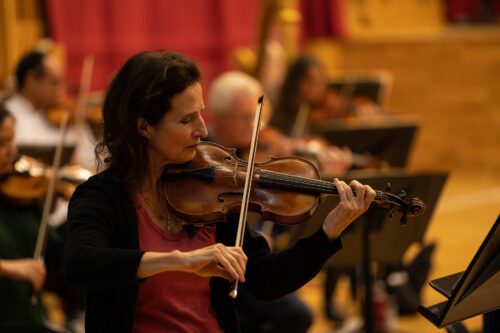 United Kingdom Grace Williams, Vaughan Williams, Bartók, Nielsen: Madeleine Mitchell (violin), BBC National Orchestra of Wales/ Jamie Phillips (conductor). Hoddinott Hall, Cardiff, 6.11.2021. (PCG)
United Kingdom Grace Williams, Vaughan Williams, Bartók, Nielsen: Madeleine Mitchell (violin), BBC National Orchestra of Wales/ Jamie Phillips (conductor). Hoddinott Hall, Cardiff, 6.11.2021. (PCG)

Grace Williams – Penillion (1955)
Vaughan Williams – The Lark Ascending (1914, rev. 1920)
Bartók – Romanian Folk Dances (1915, orch. 1917)
Nielsen – Symphony No.6 ‘Sinfonia Semplice’ (1924-1926)
Conductor Jamie Phillips, violinist Madeleine Mitchell and BBC National Orchestra of Wales had resurrected Grace Williams’s Violin Concerto a couple of days earlier (review here). Now they returned to the Hoddinott Hall for a more wide-ranging programme. It began with a performance of a more familiar Williams score: Penillion, an unusual hybrid between a symphonic suite and a trumpet concerto. This was her first work to receive a stereo recording in 1972. For many years, it ranked among her best-known pieces along with Sea Sketches and Fantasia on Welsh Nursery Tunes, but it is a more substantial composition than those. It was given a properly weighty interpretation here. The social distancing imposed on the orchestra helped to reveal many passages of unfamiliar detail (the old recording by Sir Charles Groves and the Royal Philharmonic had been made bizarrely in a Port Talbot swimming bath, and the echoing acoustic blurred many of the inner lines). The cruelly stratospheric writing for the solo trumpet occasioned a problem at one point for Andy Everton, but he held his nerve and delivered a sterling account of his soaring lines. The energetic scherzo had a really fizzing effect; the lyrical opening and slow movements had all the richness one could desire. The finale, beginning with a grand gesture like some Hollywood western film score, surged with rhythmic passion and excitement, and the dying fall at the end was beautifully judged. We certainly need a recording of the Violin Concerto, and we need a better recorded account of Penillion. These performers could do a great job.
There has been a growing tendency over the years for the ascent of Ralph Vaughan Williams’s lark to become slower and more meditative. Madeleine Mitchell was properly withdrawn in the opening pages, rising over an exquisitely quiet sustained string chord. But when the folksong-like material arrived, Jamie Phillips appeared to wish to revert to the older tempi first established by the likes of Sir Adrian Boult. The 6/8 rhythms acquired a pastoral lilt and the jogging tune that follows made its dance origins readily apparent. I am not altogether sure that the faster and probably more authentic speeds can really convince, accustomed as we have become to regarding The Lark Ascending primarily as an atmospheric impression. Dotted 6/8 rhythms in particular (as we discover in many scores by Delius and Finzi) need very careful handling if they are not to sound trivial. But there was plenty of lift and shading in the orchestral phrasing. The return to the opening stillness at the conclusion was rendered even more effective by the contrast, as Madeleine Mitchell spun her closing lines rising into space with enthralling certitude.
Bela Bartók’s orchestration of his own Romanian Dances is a peculiar piece. It employs a small chamber group of players but gives the seven connected movements a distinct coloration with only some of the small body of wind instruments in the each of the short sections. The balance is also odd. A series of slower dances gradually gather speed in the whirlwind closing riot. But they make a delightful series of vignettes with the folk elements clearly to the fore, and the orchestral playing clearly conveyed the players’ enjoyment.
I must admit that I still find Carl Nielsen’s last symphony something of a problem. After the exquisite constructions of his Fourth and Fifth Symphonies, Sinfonia semplice is far from simple, and its discursive elements are quite disturbing. The comparatively conventional opening soon dissolves into a series of brief episodes in which the listener struggles to hear any structure. The following Humoresk seems to mock those struggles, with casual snippets of phrases dismissed by a series of downward yawns on the trombones. The score actually asks for trombones to sound vulgar; Stephen Johnson’s programme note tactfully refrained from quoting a footnote instruction to the player in Danish about this. The slow solemn lines of the Proposta seria movement are equally disturbed by agitated flurries in the second violins (handled superbly here by the players). The final set of variations have an equally disparate effect: an extended waltz variation towards the end expands well beyond its expected bounds. The orchestral playing, superlatively virtuosic throughout, quite failed to disguise the lack of any sense of destination in Nielsen’s writing despite the evident good humour. The necessarily small audience clearly relished the results.
The concert is scheduled for broadcast by BBC Radio 3 at an unspecified date in the future as one of their afternoon programmes, and I shall certainly tune in. Let me also take this opportunity to repeat my urgent recommendation: make a point of hearing on Tuesday 9 November the relay of the performance I mentioned earlier. It offers a rare chance to hear Grace Williams’s Violin Concerto and an outstanding account of Vaughan Williams’s Fifth Symphony.
Paul Corfield Godfrey
